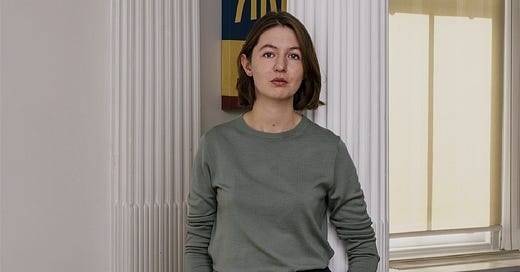Sally Rooney: Navigating the Writing Process
Sally Rooney on Writer's Block, Time, and Character Creation
This article is part of our Perspectives series.
Earlier this month, Sally Rooney was interviewed by the Paris Review. It's a long conversation between her and Merve Emre about her new book coming out. They cover a wide range of topics, but I’m sharing the parts I found most interesting below including: how Rooney deals with writer's block, her ideas about characters in her stories, and how writing a novel changes your relationship with time.
Additional articles linked in this post:
"I don’t know myself how I paint" -Vincent van Gogh on never learning to paint.
Anne Lamott on how reading and writing decrease feelings of isolation
If you want to support my work, please share it with someone (it helps so much).
Reading to Overcome Writers Block
“I always hit obstacles at some point in writing a novel. It can be rough, and I got near the end of this one and didn’t know how the book ended. I was writing and rewriting and rewriting loads of scenes that didn’t really feel right, and then, for some reason, I started reading what you call the ordinary language philosophers… I ended up reading Philosophical Investigations, and I felt, after I read it, that I knew how to finish Intermezzo… My reading of Investigations helped me to see that more clearly, or to pursue that more passionately.”
See also:
The Mind-Body Connection in Writing
“The mind-body problem is interesting for me, because when I’m writing my novels, I feel like I am a floating brain. I forget that I physically exist. I’m a Word document. It can be a shock for me to catch sight of my own reflection—not that I’m shocked at what I look like, but that I look like anything at all. It’s strange to exist while I think I’m floating in the ether with these characters.”
Fiction vs. Autofiction: The Boundaries of Imagination
“…people believe or want to believe that my books are drawn from my life. It makes me think, How busy do you think I am? To me it feels silly, but when I protest and say, “My books are completely fictional, and I don’t draw from real life,” I get a laugh from the audience, as if they think I’m joking… But I think some people don’t believe you can come up with fictional characters, because it’s such a weird thing to do. It would be more normal if I just wrote about things that happened to me, because it’s conceivable why a human being would want to write about troubling experiences—as a form of catharsis, for instance—and then market it as a novel.”
This reminds me of a letter that Van Gogh sent to his brother, where he expressed that he doesn’t even know how he paints; he just feels his way through it. He’s always inventing, always creating. Making it up as he goes along
Embracing the Limits of the Novel
“The questions asked by the modernist novel are the questions that we, as contemporary novelists, are trying to answer still. Loving the novel is a bit like a rebellious love, like a teenager’s reaction to their parents’ love... I like the limitations of the novel. I like feeling them pressing in on me while I’m trying to get close to my characters.”
Bringing Characters to Life
“I also think—and I hope this doesn’t sound like self-flattery—that sometimes when you read a book where the characters feel real, you think, Well, maybe they are. That’s a lovely compliment to a book, to think that the characters have come alive as much for the reader as they have for me. That’s my whole ambition. When I feel full of life, full of this fictitious life that doesn’t happen in our world, but in a world very close at hand, I want to be able to bring that to somebody who picks the book up, even if it’s just one person.”
See also: Ernest Hemingway's Letter to F Scott Fitzgerald about what makes good writing
A Writer’s Strange Relation with Time
“I’m hesitant to get into my own psychology, but I’m aware that for me, writing novels is a way of preventing or being in denial about the passing of time. The years I spent on this book passed, and I can never have them back, but I do have the book. It’s like I’ve stored that time in a jar, like it can never quite get away from me, because it’s in there. There is a sense of pouring life into the novels and feeling like I get to live the lives of my characters. It does give me a doorway out of the world where time passes, as it does for all of us, into a world where I get to control the passing of time. The chronology of the book runs from about September to December of a single year, and when I was writing it—it took me about three years to write—I often got confused about what time of year it was in real life. I would be in October with my characters, but it was actually May.”
See also: Anne Lamott on how reading and writing decrease feelings of isolation
Thanks for reading! If you want access to the full archive, consider upgrading to a paid subscription. You can also help me grow by sending this to a friend. Thanks, and see you next time!





